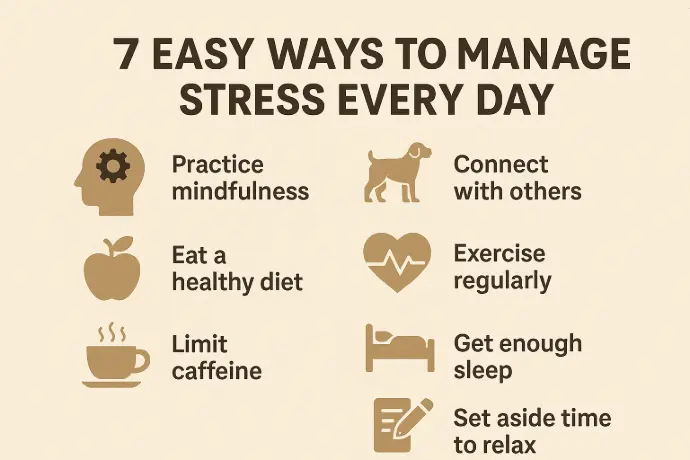
In today’s busy world, stress has become a part of our daily lives. From work pressure to family responsibilities, financial worries to social demands many things can make us feel tense or overwhelmed. While a littl^e stress can motivate us, too much of it can harm our body and mind. That’s why learning how to manage stress is important for a healthy and happy life.
The good news? You don’t need to do anything fancy or expensive. Just a few simple changes in your daily routine can help you feel calmer and more in control. In this article, we’ll share 7 easy and effective stress management techniques that you can start using today.
1. Take Deep Breaths

This may sound too simple but it really works! When you feel stressed, your heart beats faster and your breathing becomes shallow. Deep breathing helps your body relax and sends a signal to your brain to calm down.
Try this:
● Sit or lie down comfortably.
● Inhale slowly through your nose for 4 seconds.
● Hold your breath for 4 seconds.
● Exhale slowly through your mouth for 6–8 seconds.
● Repeat this 5–10 times.
Do this for a few minutes whenever you feel anxious, and you’ll notice your body and mind calming down.
2. Exercise Regularly

Moving your body is one of the best ways to reduce stress. Exercise releases chemicals called endorphins that make you feel happy and relaxed. It also improves your sleep and boosts your confidence.
You don’t have to go to the gym or lift heavy weights. Just choose an activity you enjoy:
● Walking or jogging
● Dancing
● Yoga or stretching
● Cycling
● Playing a sport
Even 20–30 minutes of movement a day can make a big difference in how you feel.
3. Sleep Well

Poor sleep makes stress worse. When you don’t sleep enough, your mind becomes tired, and it’s harder to think clearly or control your emotions.
To sleep better:
● Go to bed and wake up at the same time every day.
● Avoid screens (phone, TV, computer) at least 30 minutes before bed.
● Keep your bedroom quiet, dark, and cool.
● Avoid caffeine and heavy meals at night.
Try creating a relaxing bedtime routine like taking a warm shower, listening to soft music, or reading a calming book.
4. Eat Healthy

What you eat affects how you feel. Eating too much junk food, sugar, or caffeine can make your stress worse. A balanced diet keeps your energy levels steady and supports your mental health.
Here are some stress-fighting foods:
● Fresh fruits and vegetables
● Whole grains (like oats, brown rice)
● Nuts and seeds
● Yogurt or curd
● Herbal teas like chamomile or green tea
● Water stay hydrated!
Avoid skipping meals, and try eating slowly and mindfully instead of rushing.
5. Talk to Someone

Don’t keep stress bottled up inside. Talking about your feelings can lighten your load. Share your worries with a friend, family member, or someone you trust. Sometimes, just being heard can make you feel better.
If you find it hard to talk to someone close, you can also:
● Write in a journal
● Join a support group
● Speak to a counselor or therapist
● You are not alone. There is always help available.
6. Take Breaks and Rest

Working too much without breaks can lead to burnout. Give your mind and body short breaks throughout the day, especially when you're feeling tired or overwhelmed.
Here’s what you can do:
● Take a 5-minute walk
● Stretch your body
● Listen to music
● Drink a cup of tea
● Close your eyes and breathe
Also, make sure to take some “me time” regularly. Do something you enjoy reading, painting, gardening, or simply sitting in silence. Rest is not a waste of time; it’s how you recharge.
7. Practice Gratitude and Positivity

When we’re stressed, we often focus only on what’s going wrong. But shifting your focus to the good things in your life can change your mood and mindset.
Try this:
● Write down 3 things you’re grateful for every day.
● Celebrate small wins even if it's just completing your to-do list.
● Replace negative thoughts with kind and positive ones.
● A positive attitude doesn’t mean ignoring problems, but it helps you face them with strength and hope.
Bonus Tip: Limit News and Social Media
Too much news or scrolling on social media can increase anxiety and stress. Set limits on how much time you spend on these platforms. Choose uplifting or educational content instead of negative or stressful ones. Remember, it’s okay to disconnect and protect your peace of mind.
Final Thoughts
Stress is a part of life, but it doesn’t have to control you. By practicing these simple techniques, you can reduce stress and improve your overall health and happiness.
Start with one or two of these tips and slowly build them into your routine. Be kind to yourself. Change doesn’t happen overnight but with small daily efforts, you can stay calm, stay strong, and live a more peaceful life.
Thank You...
